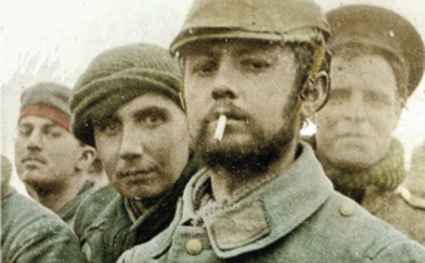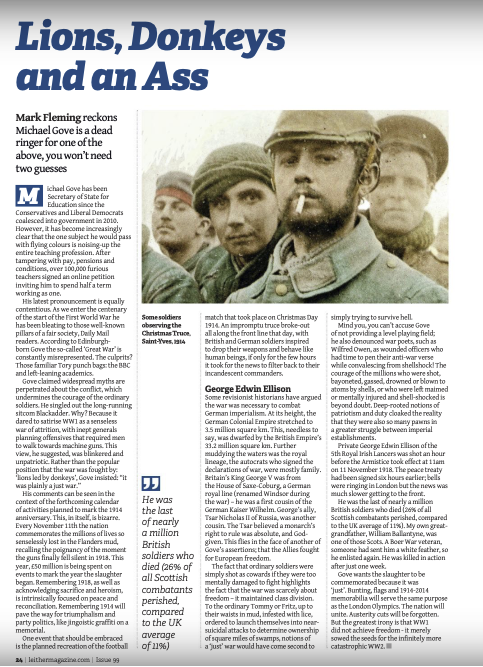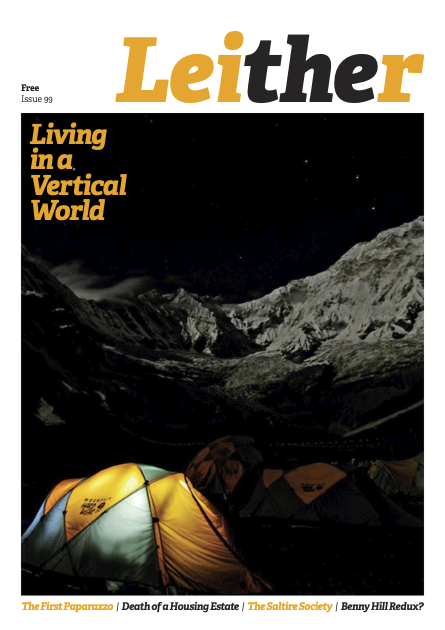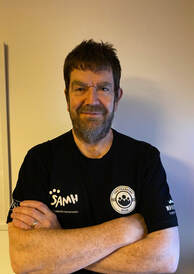Published in Issue 99 of The Leither, my article entitled 'Lions, Donkeys, and an Ass,' contrasted the stolid courage of the ordinary soldiers during World War 1, with the blinkered tactics of their superiors, who believed whichever side was wiling to sacrifice most young men during the senseless war of attrition would prevail. Michael Gove upheld the latter point-of-view.Michael Gove has been Secretary of State for Education since the Tories and Lib Dems coalesced into government in 2010. However, the one subject he would pass with flying colours is noising-up the entire teaching profession. After tampering with pay, pensions and conditions, over 100,000 furious teachers signed an online petition inviting him to spend half a term working as one. His latest pronouncement is equally contentious. As we enter the centenary of the start of World War 1 he has been bleating to those pillars of a fair society, Daily Mail readers. According to Edinburgh-born Gove the so-called 'Great War' is constantly misrepresented. The culprits? Those familiar Tory punchbags: the BBC and left-leaning academics. Gove claimed widespread myths are perpetrated about the conflict that undermine the courage of the ordinary soldiers. He singled out the long-running sitcom Blackadder. Why? Because it dared to satirise WW1 as a senseless war of attrition, with inept generals planning offensives that required men to walk towards machine guns. This view, he insisted, was blinkered and unpatriotic. Rather than the popular position that the war was fought by 'lions led by donkeys', Gove insisted: “it was plainly a just war”. His comments can be seen in the context of the forthcoming calendar of activities planned to mark the 1914 anniversary. This, in itself, is bizarre. Every November the 11th the nation commemorates the millions of lives so senselessly lost in the Flanders mud, recalling the poignancy of the moment the guns finally fell silent in 1918. Instead £50 million is being spent on events to mark the year the slaughter began. Remembering 1918, as well as acknowledging sacrifice and heroism, is intrinsically focused on peace and reconciliation. Remembering 1914 will pave the way for triumphalism and party politics, like jingoistic graffiti on a memorial. An impromptu truce broke-out on the front line that day, with British and German soldiers inspired to drop their weapons and behave like human beings, if only for the few hours it took for the news to filter back to their incandescent commanders. One event that should be embraced is the planned recreation of the football match that took place on Christmas Day 1914. An impromptu truce broke-out all on the front line that day, with British and German soldiers inspired to drop their weapons and behave like human beings, if only for the few hours it took for the news to filter back to their incandescent commanders.
Some revisionist historians have argued the war was necessary to combat German imperialism. At its height, the German Colonial Empire stretched to 3.5 million square km. This was dwarfed by the British Empire's 33.2 million square km. Another aspect of European history was that the autocrats who signed the declarations of war, were mostly family. Britain's King George V was from the House of Saxe-Coburg, a German royal line (renamed Windsor during the war). He was a first cousin of the German Kaiser Wilhelm. George's ally, Tsar Nicholas II of Russia, was another cousin. The Tsar believed a monarch's right to rule was absolute, and God-given. This flies in the face of another of Gove's assertions, that the Allies fought for European freedom. Gove also denounced war poets, such as Wilfred Owen, as wounded officers who had time to pen their anti-war verse while convalescing from shell-shock. That ordinary soldiers were simply shot as cowards if they were too mentally damaged to fight highlights that the war was scarcely about freedom. It maintained class division. To the ordinary Tommy or Fritz, up to their waists in mud, infested with lice, ordered to launch themselves into near-suicidal attacks to determine ownership of square miles of swamps, notions of a 'just' war would have come second to simply trying to survive hell. The courage of the millions who were shot, bayoneted, gassed, drowned or blown to atoms by shells, or who were left maimed or mentally-injured and shell-shocked is beyond doubt. Deep-rooted notions of patriotism and duty cloaked the reality that they were also so many pawns in a greater struggle between imperial establishments. Private George Edwin Ellison of the 5th Royal Irish Lancers was shot an hour before the Armistice took effect at 11:00 on 11 November 1918. The peace treaty had been signed six hours earlier; bells were ringing in London but the news was much slower getting to the front. He was the last of nearly a million British soldiers who died (26% of all Scottish combatants, compared to the UK average of 11%). My own great-grandfather, William Ballantyne, was one of those Scots. A Boer War veteran, someone had sent him a white feather, so he enlisted again. He was killed in action after one week, leaving behind a wife and six children decades before any welfare state. Gove wants the slaughter to be commemorated because it was 'just'. Bunting, flags and 1914-2014 memorabilia will serve the same purpose as the London Olympics. The nation will unite. Austerity cuts will be forgotten. But the greatest irony is that WW1 did not achieve freedom - it merely sowed the seeds for the infinitely more catastrophic WW2. |
|




 RSS Feed
RSS Feed
